The Enduring Legacy of Margaret Thatcher

Introduction
Margaret Thatcher, the first female Prime Minister of the United Kingdom, remains an iconic and polarising figure in British politics. Serving from 1979 to 1990, her leadership style and policies have shaped modern conservatism and left an indelible mark on the UK and the global stage. Understanding her influence is crucial to comprehending contemporary political dynamics and the evolution of governance in Britain.
Early Life and Political Rise
Born on October 13, 1925, in Grantham, Lincolnshire, Thatcher studied chemistry at the University of Oxford before entering politics. She was elected as the Member of Parliament for Finchley in 1959. Throughout the 1960s and 1970s, Thatcher ascended through the ranks of the Conservative Party, becoming the Secretary of State for Education and Science. Her steadfast determination earned her the leadership of the Conservative Party in 1975, positioning her to challenge the Labour government.
Thatcher’s Prime Ministership
In May 1979, Thatcher became Prime Minister amid economic turmoil, high unemployment, and widespread strikes. Her government implemented sweeping economic reforms known as “Thatcherism,” characterised by deregulation, privatisation of state-owned companies, and reducing the power of trade unions. Policies such as increasing interest rates and cutting public spending were controversial, prompting both fervent support and significant opposition. Despite widespread protests, she remained steadfast in her approach, believing that only through these measures could the economy be revitalised.
Foreign Policy and the Cold War
Thatcher’s foreign policy was equally impactful. She developed a close rapport with US President Ronald Reagan, which solidified the Western alliance against Soviet communism. Her decision to send British troops to reclaim the Falkland Islands in 1982 further enhanced her image as a resolute leader, leading to a successful military campaign against Argentina. However, her policies also drew criticism for their perceived neglect of societal welfare, particularly among the working class.
The End of Her Leadership
After three terms in office, Thatcher’s leadership faced mounting pressure from within her party and public discontent over her unpopular poll tax. In November 1990, she resigned, leaving behind a controversial legacy that continues to influence British politics today.
Conclusion
Margaret Thatcher’s legacy is marked by her strong leadership and transformative policies, which have sparked a lasting debate about the effectiveness and morality of her approaches. As the UK grapples with contemporary issues such as economic inequality and the role of government, understanding Thatcher’s impact offers valuable insights into the complexities of British political life. Her influence is likely to be examined and debated for years to come, illustrating the profound effects one leader can have on an entire nation.
